Vitamin D is a powerful compound that is mainly known to keep your bones strong, but it actually does way more than that, affecting nearly every part of the body. Your body produces it naturally by absorbing the sun through your skin.
However, in the northern hemisphere it’s hard to get enough sun to produce vitamin D. This is where high-quality vitamin D supplements come in.
Below we explore the best vitamin D supplements, their benefits, and more.
Rankings
1. Essential Elements D3
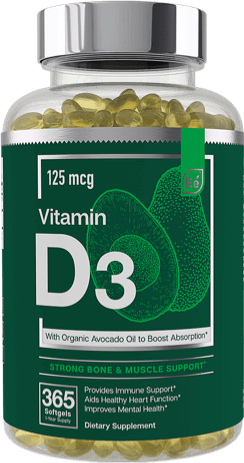
Essential Elements vitamin D3 is a high-quality supplement made with organic avocado oil, in an easy-to-swallow pill. It has been clinically shown to help with healthy teeth, bone, muscle function, improved immunity, and improved cardiovascular function.
What we liked: One bottle includes a six month supply, and the more you buy, the more you save. The Essential Elements vitamin D3 is gluten, sugar, preservative, shellfish, dairy, and soy-free. This product is also combined with avocado oil for more bioavailability.
Flaws: Essential Elements vitamin D3 contains gelatin, so it’s not acceptable for vegans.
2. Nature Made Extra Strength Vitamin D3
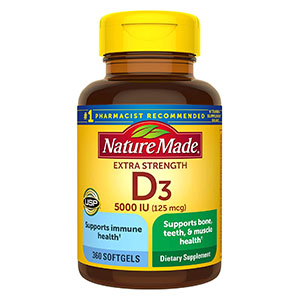
Nature Made vitamin D3 uses sunflower oil as a carrier for bioavailability, and each softgel has 5000 IU of vitamin D3. It also comes at a highly affordable price.
What we liked: As mentioned above, this product is affordable, but it also has excellent reviews. It contains no artificial colors, preservatives, sweeteners, and is gluten-free and non-GMO.
Flaws: Don’t leave these softgels in the sun lest they melt together.
3. NatureWise Vitamin D3
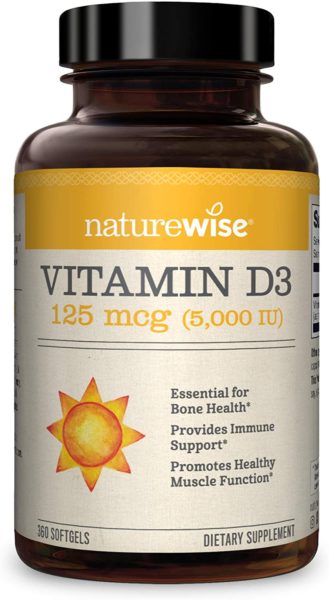
NatureWise vitamin D3 has 360 capsules at an incredible price point. This supplement also boasts excellent purity because of its natural ingredients.
What we liked: Combined with organic olive oil, this vitamin D supplement comes in easy-to-swallow soft gels. It has almost 20,000 reviews with a 4.8-star rating.
Flaws: The product is made in China and bottled in the USA.
4. Sports Research Vitamin D3
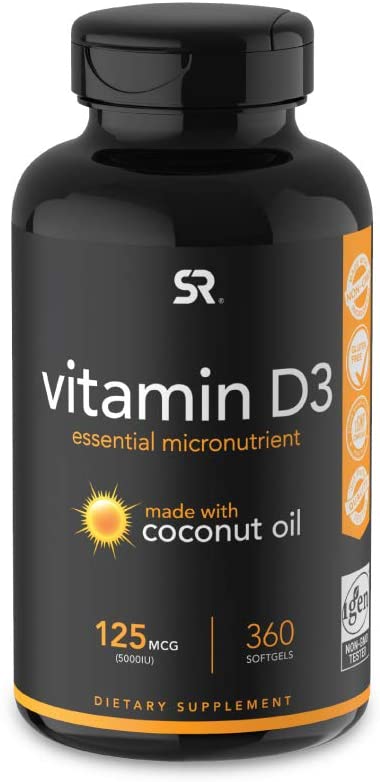
Sports Research vitamin D3 is a USA-manufactured vitamin that has over 13,000 reviews on Amazon with a 4.8-star rating. Consumers love the quality and efficiency of the vitamin. It’s sleek and easy-to-use design also offers convenience and curb-appeal to the average consumer.
What we liked: This soft gel is made with coconut oil and is easy to swallow. The company offers a 90-day money-back guarantee. One bottle contains a one-year supply.
Flaws: This product isn’t suitable for those who are allergic to nuts.
5. VitaFusion D3 Gummies

For those who don’t like to swallow pills or have difficulty can choose this delicious gummy vitamin option. It even has award-winning taste certified by ChefsBest.
What we liked: Gummy vitamins taste great. VitaFusion is an award-winning brand for the quality and taste of their vitamins. These vitamins are combined with coconut and palm oils for absorption.
Flaws: Gummy vitamins contain a lot more ingredients and sugars than pills or drops.
6. NOW Supplements Vitamin D3
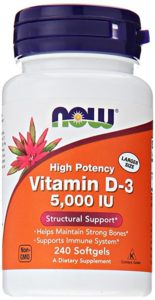
This high-potency vitamin D supplement is a great value and has incredible feedback from customers. There are 240 softgels, and each pill has 2,000 IU.
What we liked: This supplement is non-GMO, Halal, and Kosher friendly. The dosage is smaller, so consumers have the choice to take one or two pills per day in order to meet their needs.
Flaws: These pills are not vegan as they contain gelatin.
7. Vitamin D by Nature’s Bounty
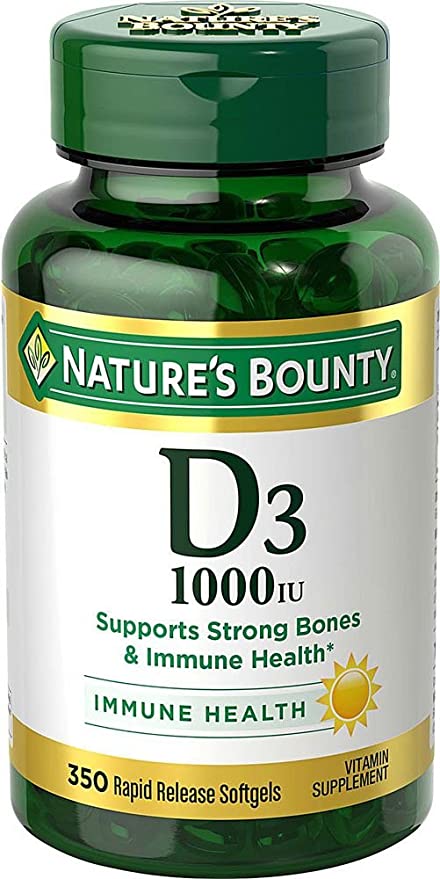
Nature’s Bounty has been creating quality supplements for 50 years. Each pill has 1000 IU, making it easier for customers to tailor their dosage.
What we liked: Nature’s Bounty vitamin D3 softgels are non-GMO, gluten- and sugar-free, and contain no artificial colors, or sweeteners. Nature’s Bounty is also considered a reputable brand, making various supplements for consumers.
Flaws: They use a mix of soybean oil and corn oil, which aren’t the best choices.
8. Pure Therapro Rx Vegan D3 + K2
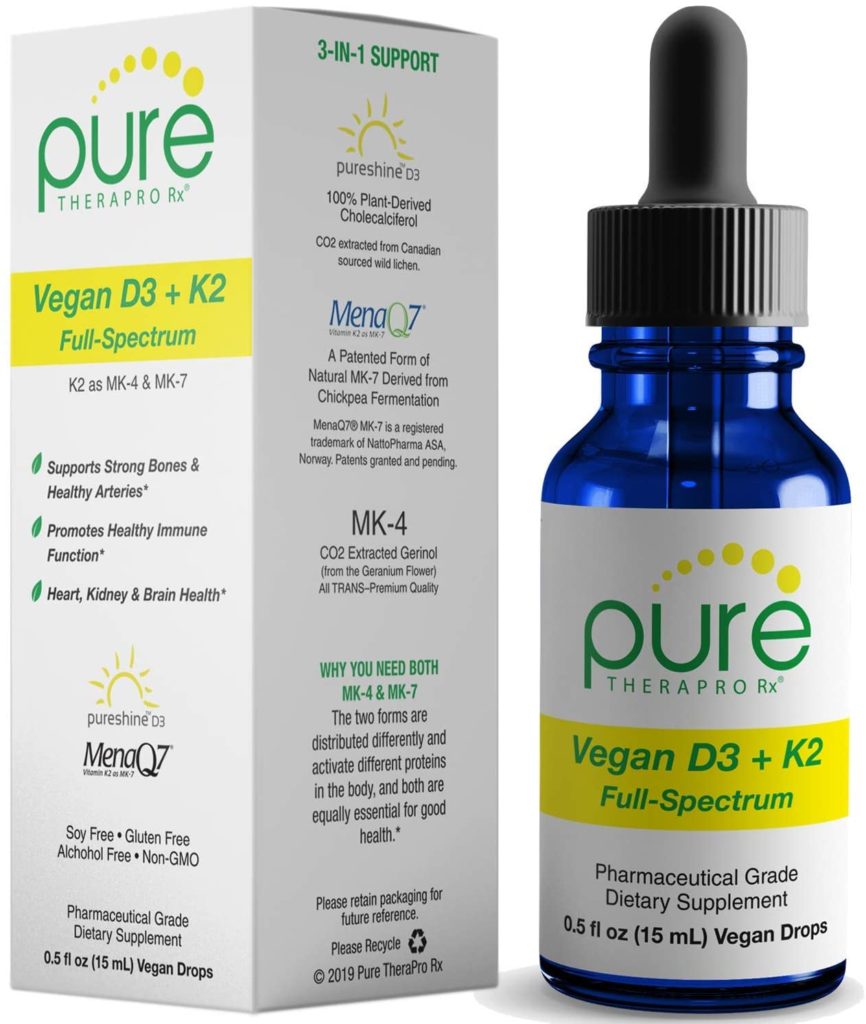
These vitamin D drops are ideal for those who don’t want to take a pill, or for those who are vegan, as there is no gelatin present.
What we liked: These drops are a combination of vitamin D3 and K2. This means that the calcium that vitamin D helps the body absorb, vitamin K can help utilize within the body properly. It’s also combined with coconut oil for bioavailability.
Flaws: It is much more expensive than other types of supplements.
9. Sports Research Vegan Vitamin D3
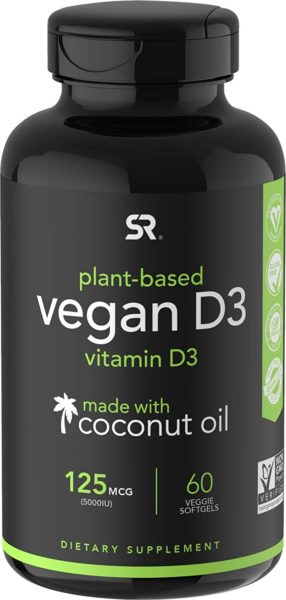
Sports Research claims to be the only non-GMO Verified, vegan-certified, carrageenan-free, vitamin D3 softgel available.
What we liked: The Sports Research capsules are vegan, so this is a great option for vegans who don’t want to use drops. It’s mixed with high-quality coconut oil for bioavailability.
Flaws: Each capsule is above the recommended daily dosage, so please get your doctor’s advice before taking it.
10. Bronson Vitamin D3 10,000 IU
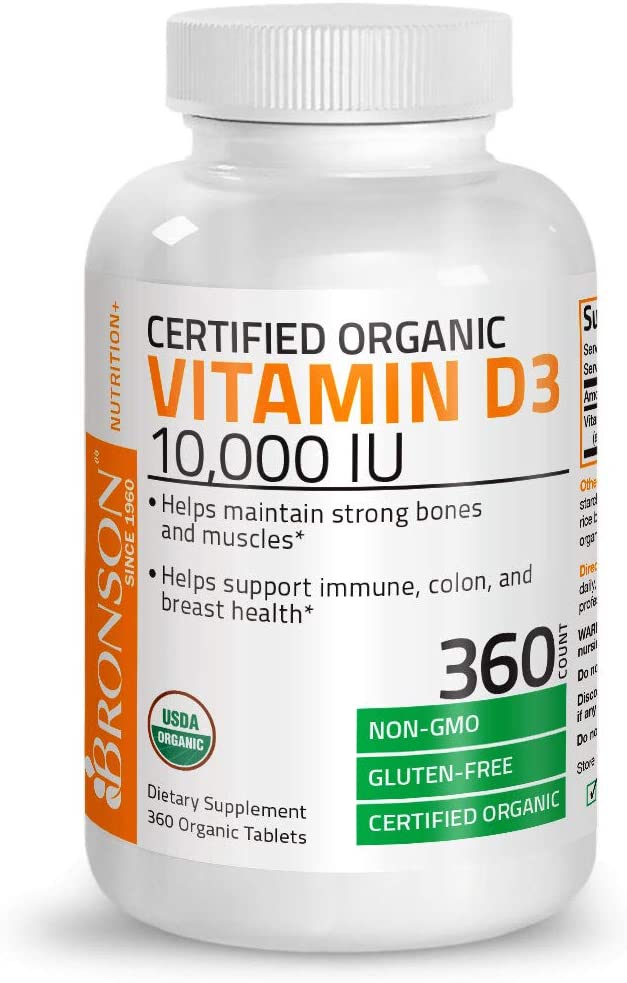
Bronson has been making supplements since 1960, and is one of the most trusted among consumers.
What we liked: For those fighting a vitamin D deficiency, this product is twice the recommended daily amount to impact vitamin levels quickly. These supplements are SDA Certified Organic.
Flaws: This isn’t the purest supplement on the market.
Who Should Buy Vitamin D?
There are a variety of individuals who may need a vitamin D supplement who struggle to get it through diet and lifestyle. Vegans, obese individuals, and elderly individuals should check if they are deficient. This may involve booking an appointment with your doctor and getting blood tests completed.
If vegans don’t consume vitamin D fortified plant milk, they may struggle to meet the required intake. Through the average diet and lifestyle of obese individuals, it’s likely they will be deficient.
As we age, the process of vitamin D synthesizing from the sun and from food becomes less efficient, meaning that older individuals should ensure they’re not deficient. Surprisingly, many people are deficient in vitamin D, but they just don’t realize it.
How We Ranked
When determining the best vitamin D supplements, we first analyzed the dosage. Our top picks, Essential Elements and Transparent Labs, have at least 1000 IUs of vitamin D. This falls in line with the recommended dosage for the average adult per day, which is about 600 IUs and 800 IUs for more elderly individuals. Purity was also important, and products that contained unnecessary binders, fillers, or sugars ranked poorly.
We also had a strong preference for vitamin D supplements that were delivered with a liquid fat. Adding a healthy fat, like avocado oil, can greatly impact the absorption of vitamin D, which is why products like Essential Elements ranked so well.
Lastly, we looked at the delivery method. Pills were the preferred form because they traveled well and made dosing easy. However, high-quality dropper products like Pure Therapo also made the list.
FAQ
Q: Are high doses of vitamin D safe?
A: Vitamin D is a relatively safe supplement to be taking (1). High doses of the vitamin are required when treating a deficiency, but the long term effects of taking 4,000 IU daily could cause high levels of calcium in the blood. This amount is a short-term solution to preventing deficiency.
Q: Do high vitamin D levels lead to issues?
A: Vitamin D could increase the risk of kidney stones in people with sarcoidosis, which is an inflammation of the body organs like the lungs of lymph nodes. The increasing calcium effect of vitamin D harms these patients. Tuberculosis patients experience the same risks, with increased calcium levels in the blood, kidney stones may occur.
Q: What are the symptoms of too much vitamin D?
A: Symptoms of too much vitamin D include fatigue, headache, loss of appetite, weakness, nausea, metallic taste, dry mouth, vomiting, and sleepiness.
Q: Can individuals with atherosclerosis or kidney disease take vitamin D?
A: Vitamin D should not be taken if you have atherosclerosis, or hardening of the arteries, as this may make the condition worse (2). It could seriously harm those who have kidney disease and atherosclerosis. Further, individuals who have histoplasmosis, or a specific type of fungal infection, should not take vitamin D. Taking the vitamin with this condition could lead to kidney stones.
Individuals who have high levels of calcium in the blood already should not take vitamin D. For those who have Lymphoma, taking vitamin D may lead to kidney stones or other conditions due to the increased calcium in the blood.
Q: What happens if you’re vitamin D deficient?
A: Severe deficiency can lead to Rickets, which appears in children and results in weakness, abnormal growth patterns, bone issues and pain, and possibly deformities. While this is rare with our medical advancements today, this can still happen. It’s not as evident in adults and can show up as bone pain, fatigue, depression, weakness, muscle cramps, or aches.
Q: What causes vitamin D deficiency?
A: Certain ailments like Cystic Fibrosis, Crohn’s disease, and celiac disease can cause a vitamin D deficiency. Recipients of weight loss surgery have an increased risk of deficiency because of the increased difficulty of nutrient absorption, although this can be mitigated by increased sun exposure (3).
Other factors include age, lack of mobility, skin color, and breastfeeding babies. Individuals in certain areas of the world where they don’t receive enough sunlight during their day-to-day may also experience vitamin D deficiency.
Q: What is the difference between vitamin D2 and D3?
A: Vitamin D2 comes from plants, and D3 comes from animals. Healthy sources of vitamin D2 include mushrooms that are grown under UV lights, dietary supplements, and fortified foods. D3 sources include fish and fish oil, butter, egg yolk, liver, and dietary supplements. Vitamin D3 is the most common supplement type on the market and the type of vitamin that is produced by the skin.
Q: What happens if I take too much vitamin D?
A: If you’ve taken too much vitamin D you may experience fatigue, headache, loss of appetite, weakness, nausea, metallic taste, dry mouth, vomiting, and sleepiness. If you feel you are in medical distress, please visit your nearest emergency room.
Q: Should I take vitamin D if I am pregnant or breastfeeding?
A: Caution is required when taking vitamin D during pregnancy (4), so please consult with your doctor to ensure it’s necessary during this time. Taking higher amounts during pregnancy and breastfeeding are not advised, and your dosage should be determined through blood tests and under doctor supervision. Higher doses may cause harm to your child.
Q: What is the dosage for vitamin D?
A: The ideal dose for most people needs to be determined by their doctor because it’s based on blood levels. When you go for bloodwork, the doctor will measure the calcifediol, which is the storage form of vitamin D.
Q: Should I take vitamin D if I am taking other supplements?
A: If you are taking calcium supplements, it’s best to check with your doctor before taking vitamin D. Bringing calcium levels up can have adverse effects, but some treatments include combining the two. Please consult your doctor before taking this supplement.
Q: Should I take vitamin D if I am taking other medications?
A: Supplements that interact with vitamin D include antacids that have aluminum, Calcipotriene (Dovonex), Cimetidine (Tagamet), Digoxin (Lanoxin), Diltiazem (Cardizem, Dilacor, Tiazac), Heparin, Low molecular weight heparins (LMWHS), Verapamil (Calan, Covera, Isoptin, Verelan), and Water pills (Thiazide diuretics).
You should consult your doctor before adding vitamin D into your routine if you are on any of these medications. Again, they know you and your health situation and history the best and will be able to make appropriate recommendations suitable to you and your needs.
Q: Who shouldn’t take vitamin D?
A: Individuals who have Lymphoma, kidney, or liver diseases should avoid taking vitamin D. Patients who have the fungal infection histoplasmosis, or hardening of the arteries should not take vitamin D. The vitamin may exacerbate symptoms and cause adverse effects. There are times when it is appropriate for those who have kidney disease to take it, but it must be closely monitored by a doctor.
Q: What are the ways to increase vitamin D absorption?
A: Vitamin D supplements are combined with a healthy fat to make it more bioavailable (5). Having vitamin D with meals that include nuts, avocados, eggs, or fish, can help the body absorb the benefits a bit better.
Q: Does vitamin D increase fertility?
A: While there is no direct evidence linking vitamin D to increased fertility in men or women, the vitamin does promote overall well being. For information on fertility treatments, please visit your doctor or your local fertility clinic.
Q: Does vitamin D act as a steroid?
A: While vitamin D does promote healthy muscles, bones, and increased strength, it’s not a conventional steroid. The vitamin is considered a steroid hormone because it is produced by the body when exposed to the sun.
Q: Does vitamin D cause constipation?
A: One symptom of vitamin D deficiency could be constipation, but taking a vitamin D supplement should not cause any bowel issues. If you have taken too much vitamin D for a long period of time, you may start to see undesirable effects. If these occur or you have any concerns, please discuss your options with your doctor.
Q: Is vitamin D good for my eyes?
A: There have been some recent studies that show that vitamin D protects your eyes and may prevent degenerative eye issues that come with age (6). Conditions like macular degeneration, glaucoma, and cataracts could be prevented when getting optimal levels of vitamin D.
Deficiency could delay healing of the eyes and cornea when disease and injury occur. The vitamin promotes healthy cell communication in the eyes, and the proteins between the cells that exchange amino acids, vitamins, proteins, and sugars are strengthened as a result of adequate levels.
Q: Is vitamin D good for skin?
A: Many skincare products include topical vitamin D and antioxidants that claim to help prevent aging and be great for the skin. Evidence shows that it’s more effective to take the vitamin orally to help benefit the skin. When getting adequate amounts of vitamin D in your diet and supplement routine, it may be able to help treat psoriasis (7), dry skin, and other skin conditions.
Q: Can vitamin D help me lose weight?
A: Vitamin D is not directly linked to weight loss, but getting an adequate amount may result in a healthier lifestyle. Getting vitamin D from the diet, the sun, and supplements could be your best chance at reaching optimal levels. From your diet, vitamin D is found in healthy fish, eggs, and fortified foods.
Getting outside for some sun and exercise is extremely beneficial. A supplement will pick up the slack for what you can’t get through diet and being outdoors. Overall, there is no link, but it could potentially help the process.
Q: Should I take vitamin D with food?
A: It’s best to take vitamin D with a meal full of healthy fats to increase the chances of absorption because it is a fat-soluble vitamin.
Related Articles
Multivitamins for women
Multivitamins for men
Recap
Vitamin D supplements are an affordable way to improve bodily functions and prevent deficiency. Vitamin D is further known for its mental health benefits, improved immune function, and improved heart function. A large number of adults are deficient in this important vitamin, and a supplement is a great option to ensure you are getting enough of it.
However, if you are on any medication, are unsure of how much you need, or have a history of health conditions, it may be best to consult with your doctor first. Blood tests can help determine if you are, in fact, vitamin D deficient and whether or not supplements are a good choice for you.
For CPOE.org’s #1 recommended vitamin D supplement, click here.

